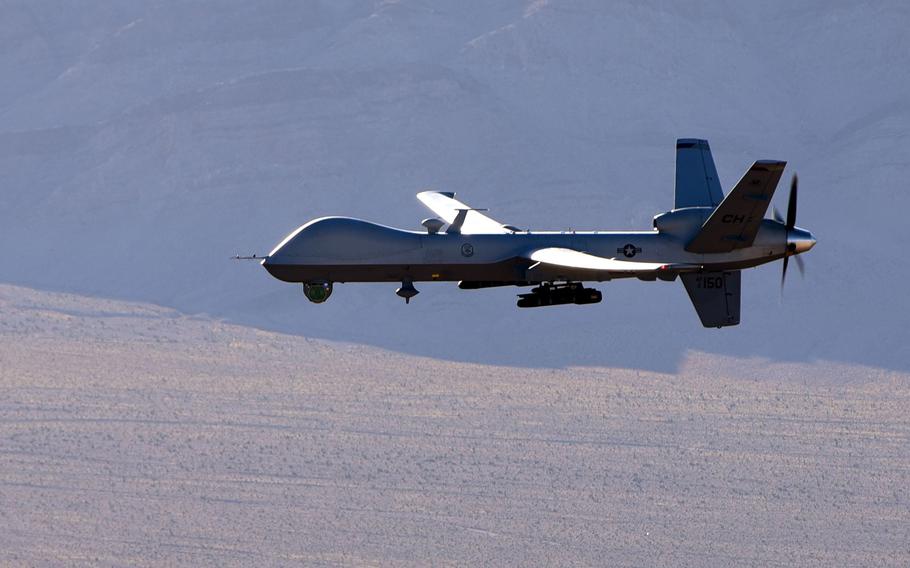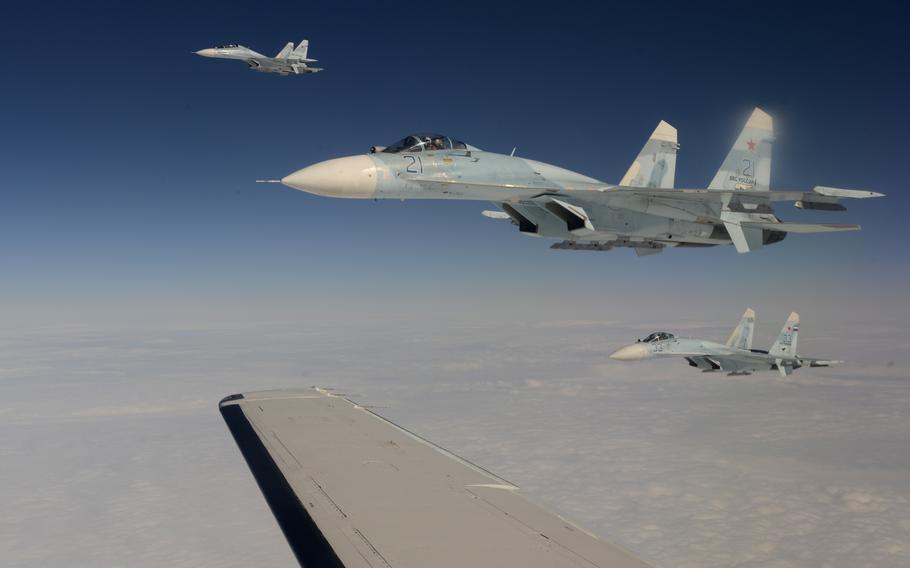
An MQ-9 Reaper flies a training mission over the Nevada Test and Training Range in July 2019. A Russian Su-27 aircraft struck the propeller of an MQ-9 on March 14, 2023, causing the drone to crash in international waters. (William Rio Rosado/U.S. Air Force)
STUTTGART, Germany — A Russian fighter jet collided with a U.S. drone Tuesday over the Black Sea, forcing the unmanned aircraft to crash into international waters, U.S. European Command said.
At about 7 a.m., two Russian Su-27 aircraft conducted “an unsafe and unprofessional intercept” with a U.S. Air Force drone, the Stuttgart, Germany-based EUCOM said.
One of the Su-27s struck the propeller of the MQ-9 during the incident, EUCOM said. That forced the aircraft’s controllers to bring it down into the Black Sea, the command said.
Several times before the collision, the Su-27s dumped fuel on and flew in front of the MQ-9 in a reckless, environmentally unsound and unprofessional manner, the EUCOM statement said.
"Our MQ-9 aircraft was conducting routine operations in international airspace when it was intercepted and hit by a Russian aircraft, resulting in a crash and complete loss of the MQ-9," Gen. James Hecker, U.S. Air Forces Europe and Air Forces Africa commander, said in a statement. "In fact, this unsafe and unprofessional act by the Russians nearly caused both aircraft to crash."
Russia’s Defense Ministry said the U.S. drone maneuvered sharply and crashed into water following an encounter with Russian fighter jets scrambled to intercept it near Crimea, but insisted its warplanes didn’t fire their weapons or hit the drone, according to the Associated Press.
EUCOM said the incident follows a pattern of dangerous actions by Russian pilots in international airspace, including over the Black Sea.
“These aggressive actions by Russian air crew are dangerous and could lead to miscalculation and unintended escalation,” EUCOM said.

A Russian air force Su-27 Sukhoi intercepts a simulated hijacked aircraft over Russian airspace in 2013. On Tuesday, an Su-27 collided with a U.S. drone in international airspace over the Black Sea, U.S. officials said. (Jason Robertson/U.S. Air Force)
In recent years, there have been repeated close encounters between U.S. and Russian aircraft, after which the American military accused the Russians of carrying out unsafe maneuvers or harassing naval vessels on patrol.
However, none of those encounters resulted in a collision.
EUCOM did not say where the MQ-9 was flying from, but the U.S. operates out of various locations in the Black Sea region, including Mihail Kogalniceanu Air Base in Romania.
The U.S. Air Force also flies surveillance aircraft out of Campia Turzii Air Base in central Romania.
The collision over the Black Sea comes more than a year after Russia’s full-scale invasion of Ukraine and at a time of high tension between Moscow and the West.
While the Kremlin has complained about the weaponry the U.S. and other allies are sending into Ukraine, it also has taken issue with the increased number of U.S. troops that have been dispatched along NATO’s eastern flank.
The Air Force said it routinely flies throughout Europe in accordance with international laws.
"U.S. and Allied aircraft will continue to operate in international airspace and we call on the Russians to conduct themselves professionally and safely," Hecker said.
The AP reported that U.S. President Joe Biden was briefed on the incident by national security adviser Jake Sullivan, according to White House National Security spokesman John Kirby. He added that U.S. State Department officials would be speaking directly with their Russian counterparts and “expressing our concerns over this unsafe and unprofessional intercept.”
State Department spokesman Ned Price said the U.S. summoned the Russian ambassador to lodge a protest and the U.S. ambassador to Russia, Lynne Tracy, has made similar representations in Moscow.
Kirby emphasized that the incident wouldn’t deter the U.S. from continuing their missions in the area, the AP reported.
“If the message is that they want to deter or dissuade us from flying, and operating in international airspace, over the Black Sea, then that message will fail,” Kirby said, adding “that is not going to happen.”
“We’re going to continue to fly and operate in international airspace over international waters,” he said. “The Black Sea belongs to no one nation.”
The Associated Press contributed to this report.